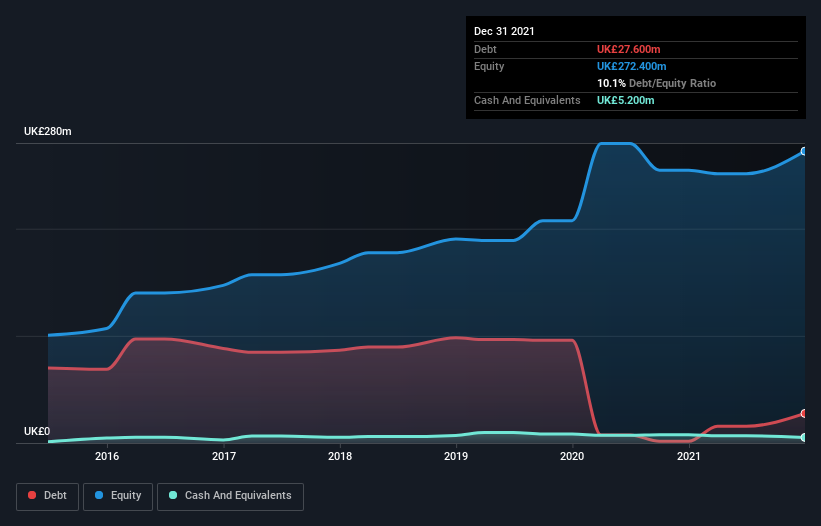- United Kingdom
- /
- Commercial Services
- /
- LSE:JSG
We Think Johnson Service Group (LON:JSG) Is Taking Some Risk With Its Debt
The external fund manager backed by Berkshire Hathaway's Charlie Munger, Li Lu, makes no bones about it when he says 'The biggest investment risk is not the volatility of prices, but whether you will suffer a permanent loss of capital.' When we think about how risky a company is, we always like to look at its use of debt, since debt overload can lead to ruin. Importantly, Johnson Service Group PLC (LON:JSG) does carry debt. But should shareholders be worried about its use of debt?
What Risk Does Debt Bring?
Debt and other liabilities become risky for a business when it cannot easily fulfill those obligations, either with free cash flow or by raising capital at an attractive price. Ultimately, if the company can't fulfill its legal obligations to repay debt, shareholders could walk away with nothing. However, a more frequent (but still costly) occurrence is where a company must issue shares at bargain-basement prices, permanently diluting shareholders, just to shore up its balance sheet. Of course, debt can be an important tool in businesses, particularly capital heavy businesses. The first step when considering a company's debt levels is to consider its cash and debt together.
See our latest analysis for Johnson Service Group
How Much Debt Does Johnson Service Group Carry?
You can click the graphic below for the historical numbers, but it shows that as of December 2021 Johnson Service Group had UK£27.6m of debt, an increase on UK£1.60m, over one year. However, because it has a cash reserve of UK£5.20m, its net debt is less, at about UK£22.4m.

How Healthy Is Johnson Service Group's Balance Sheet?
According to the last reported balance sheet, Johnson Service Group had liabilities of UK£79.0m due within 12 months, and liabilities of UK£57.2m due beyond 12 months. On the other hand, it had cash of UK£5.20m and UK£50.2m worth of receivables due within a year. So its liabilities outweigh the sum of its cash and (near-term) receivables by UK£80.8m.
Of course, Johnson Service Group has a market capitalization of UK£454.6m, so these liabilities are probably manageable. However, we do think it is worth keeping an eye on its balance sheet strength, as it may change over time.
In order to size up a company's debt relative to its earnings, we calculate its net debt divided by its earnings before interest, tax, depreciation, and amortization (EBITDA) and its earnings before interest and tax (EBIT) divided by its interest expense (its interest cover). Thus we consider debt relative to earnings both with and without depreciation and amortization expenses.
While Johnson Service Group's low debt to EBITDA ratio of 0.33 suggests only modest use of debt, the fact that EBIT only covered the interest expense by 2.6 times last year does give us pause. But the interest payments are certainly sufficient to have us thinking about how affordable its debt is. We also note that Johnson Service Group improved its EBIT from a last year's loss to a positive UK£8.2m. There's no doubt that we learn most about debt from the balance sheet. But ultimately the future profitability of the business will decide if Johnson Service Group can strengthen its balance sheet over time. So if you're focused on the future you can check out this free report showing analyst profit forecasts.
But our final consideration is also important, because a company cannot pay debt with paper profits; it needs cold hard cash. So it is important to check how much of its earnings before interest and tax (EBIT) converts to actual free cash flow. Over the last year, Johnson Service Group saw substantial negative free cash flow, in total. While investors are no doubt expecting a reversal of that situation in due course, it clearly does mean its use of debt is more risky.
Our View
Johnson Service Group's struggle to convert EBIT to free cash flow had us second guessing its balance sheet strength, but the other data-points we considered were relatively redeeming. For example its net debt to EBITDA was refreshing. When we consider all the factors discussed, it seems to us that Johnson Service Group is taking some risks with its use of debt. So while that leverage does boost returns on equity, we wouldn't really want to see it increase from here. In light of our reservations about the company's balance sheet, it seems sensible to check if insiders have been selling shares recently.
Of course, if you're the type of investor who prefers buying stocks without the burden of debt, then don't hesitate to discover our exclusive list of net cash growth stocks, today.
New: Manage All Your Stock Portfolios in One Place
We've created the ultimate portfolio companion for stock investors, and it's free.
• Connect an unlimited number of Portfolios and see your total in one currency
• Be alerted to new Warning Signs or Risks via email or mobile
• Track the Fair Value of your stocks
Have feedback on this article? Concerned about the content? Get in touch with us directly. Alternatively, email editorial-team (at) simplywallst.com.
This article by Simply Wall St is general in nature. We provide commentary based on historical data and analyst forecasts only using an unbiased methodology and our articles are not intended to be financial advice. It does not constitute a recommendation to buy or sell any stock, and does not take account of your objectives, or your financial situation. We aim to bring you long-term focused analysis driven by fundamental data. Note that our analysis may not factor in the latest price-sensitive company announcements or qualitative material. Simply Wall St has no position in any stocks mentioned.
About LSE:JSG
Johnson Service Group
Provides textile rental and related services in the United Kingdom and Ireland.
Undervalued with proven track record and pays a dividend.
Market Insights
Community Narratives



